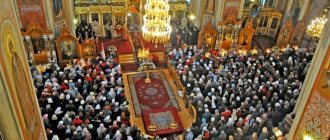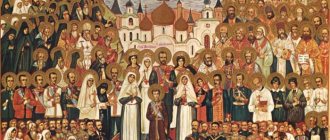Every pregnant woman has a moment when she begins to worry and worry more and more about her baby, because it is never known how the matter will end. Many people think that they need to turn to God in prayer. This will help the woman calm down, since she will be protected by higher patrons.
(Lev.12:1-7)
“And the Lord spoke to Moses, saying, Tell the children of Israel, If a woman conceives and gives birth to a male child, she will be unclean for seven days; as in the days of her suffering by purification, she will be unclean; on the eighth day his foreskin will be circumcised; and she must sit for thirty-three days, cleansing herself from her blood...If she gives birth to a female child, then during her cleansing she will be unclean for two weeks, and sixty-six days she must sit, cleansing herself from her blood....
Many Orthodox people believe that they need to pray to God for a successful birth. This will help the woman calm down, as she will be protected by higher patrons
After childbirth, a woman can visit the temple only after 40 days
Uncleanness according to the Old Testament indicates whether an Orthodox person can take part in any church rituals. Ritual purity is something incomprehensible to the human mind, but for the church it is not so important. One law that still exists today is nida.
Nida is female impurity. After the birth of a child, a woman cannot avoid bleeding. Nida occurs until the eighth clean day, when the discharge has already stopped.
A pregnant woman after giving birth cannot visit the temple. And it can be no earlier than 40 days. If a woman wants to visit the temple before the baptism of her child, then she needs to perform a ritual ceremony. The ceremony is performed by a priest.
If a woman wants to visit the temple before the baptism of her child, then she needs to perform a ritual ceremony. The ritual is performed by a priest
Why can't you go to church after giving birth?
Estimated reading time: 3 minutes.
Reader question:
Why can't you go to church after giving birth?
Answer:
Church rules require a woman not to enter the temple for forty days after giving birth. On the fortieth day, the priest must read a special prayer of permission over her. Sometimes this prayer is read later, for example, on the day of the baby’s baptism, sometimes, due to circumstances, earlier. Where did this tradition come from and why can’t you go to church after giving birth?
The origins of this custom are in the Old Testament. The book of Leviticus says: “If a woman conceives and gives birth to a male child, she will be unclean for seven days; as in the days of her suffering by purification, she will be unclean; on the eighth day his foreskin will be circumcised;
and she must sit thirty-three days, cleansing herself from her blood; She must not touch anything sacred and must not come to the sanctuary until the days of her purification are completed. If she gives birth to a female child, then during her purification she will be unclean for two weeks, and she must sit for sixty-six days, cleansing herself from her blood.
At the end of the days of purification for her son or daughter, she must bring a one-year-old lamb for a burnt offering and a young dove or turtle dove for a sin offering at the entrance of the tabernacle of meeting to the priest; he will bring it before the Lord and make atonement for her, and she will be clean from the flow of her blood” (Lev. 12:1-8).
In New Testament times, the attitude towards childbirth and the postpartum period changed: now we do not bring sacrificial animals to the temple (neither in this case nor in any other, because Jesus Christ sacrificed Himself for our sins), and the period of 40 days is taken as the average time during which a woman's postpartum discharge can continue. In addition, in the first month after childbirth, the woman needs recovery, and the child needs special care, and the woman in labor does not have enough strength or time to attend religious services.
The prayer on the 40th day is read in order to introduce a woman who has not attended church for a long time into the liturgical life of the Church. At the same time, in the first weeks after childbirth, you can and should continue to pray at home and read the Gospel.
Priest Maxim Brazhnikov , press secretary of the Orsk diocese, rector of the Kazan parish in Orsk, tells more about postpartum prayers
Priest Maxim BRAZHNIKOV
The meaning and purpose of postpartum prayers is partly pedagogical - so that parents prepare to introduce the child into the sacred space of the temple and into the Sacraments of the Church. Some are confused when praying for a woman who has given birth to ask the Lord to “wash away her bodily filth and spiritual filth.” Of course, the Church today does not believe that after giving birth to a child, a woman becomes “unclean” and can desecrate a temple with her presence. But we are all descendants of Adam, which is why the Fiftieth Psalm says: “My mother gave birth to me in sins.” The point is not that physical intercourse between a man and a woman and the conception of a child are sinful, but when a person comes into the world, he nevertheless bears the mark of original sin. The missal contains a whole cycle of prayers associated with the birth of a child - a prayer on the first day after birth, a prayer for naming, which is read on the eighth day, a prayer on the fortieth day, which is read over the mother. Next, the baby's baptism is already expected. In the practice of church life, this cycle has been somewhat transformed - for example, the naming of a name now occurs during baptism. Naturally, if necessary, for example, in case of danger to the life of the child or mother, you can baptize the child and give the mother communion without waiting for the fortieth day. There is no absolutism here; you still need to interpret these rules in the context of the era in which they appeared.
Editorial staff of the magazine "Foma"
The main prohibition for visiting the temple is that a woman should not shed blood.
But it is worth mentioning not only about religious issues regarding the ban on visiting a church for a young mother and her child. This, for example, is the fact that many people can get sick, even with simple colds, and this can greatly affect the child’s health.
What other prohibitions should you know about visiting a temple? It is also important that in the church a woman should not shed blood - this is a great law. Therefore, nowadays there are many hygiene products that women can use.
Currently, no rituals are performed in the temple.
To go to temple after childbirth, there is a special prayer. The prayer should be read before the priest. If you follow the laws of the Bible, then this happens on the fortieth day after birth. In order to get to your child’s baptism, you need to read the 40th day prayer.
Uncleanness - what is it and where did the concept come from?
The concept of uncleanness comes from the biblical Old Testament. Purity or impurity determines the state of a person, allowing him to take or not take part in the temple cult. In essence, this is ritual purity.
In complex Jewish law, ritual purity goes hand in hand with the idea of holiness. The laws set forth in the books of Moses covered all aspects of life, which reliably prevented the penetration of pagan culture into religion and reflected the ancient idea of the Jews about the close connection between God, man and the Universe.
Unlike the commandments, which are classified as explainable from the point of view of the human mind, the commandments about ritual purity are classified as incomprehensible to reason and accepted a priori, that is, perceived as a law unconditionally and without a rational explanation of its premises.
Many consider these laws as hygienic rules, but the Bible clearly defines that they have a sacred meaning, not a material one. (eg Lev. 11:43-44)
According to Jewish laws, any person without exception could become defiled by uncleanness. Both old and young, and even a newborn one day old could be defiled by all its varieties.
The highest degree of uncleanness is cadaveric, and anyone who was in the same room with the deceased, touched him or the grave, was considered ritually unclean after that for 7 days and was not allowed to enter the Temple. Interestingly, uncleanness extended not only to people, but also to the water in open vessels located next to the corpse. It was possible to eliminate the state of impurity after the prescribed period had passed through special cleansing rites, often with sacrifice.
After childbirth, a prayer is read - permissive
Prayer after childbirth is permissive. It is this cleansing prayer that gives permission to visit the Church.
Permissive prayer:
Our Lord Jesus Christ, by His Divine grace, the gift and power given by His holy disciple and apostle, to bind and solve the sins of men, said to them: receive the Holy Spirit; Their sins, if you forgive them, will be forgiven them; hold them, they will hold; and even if you bind and loose on earth, they will be bound and loose in Heaven. From them, and upon us, we receive each other (successively, one after another) by the grace that has come, so that through me, the humble one, this child (name) may be forgiven in spirit from all, even if, as a man, he has sinned against God in word, deed, or thought, and with all your feelings, willingly or unwillingly, knowledge or ignorance.
If you were under an oath or excommunication by a bishop or a priest, or if you swore an oath to your father or mother, or fell under your own curse, or broke an oath, or committed some other sin (here: was forbidden, was subject to a curse), but repent of all these with a contrite heart and from all those guilts and burdens (from what binds) let him (you) be released; great for the weakness (and everything that is due to weakness) of nature was given over to oblivion, and may she forgive him (her) everything, for her love for mankind, through the prayers of our Most Holy and Most Blessed Lady Theotokos and Ever-Virgin Mary, the glorious and all-praised apostle saints and all the saints. Amen.
Purification prayer gives a woman permission to attend Church
Impurity in Christianity
With the coming of the Savior to earth, much in the doctrine of God changed. With his activities, he violated the norms of the Old Testament teaching, which aroused hostility on the part of the Jews. The Son of God neglected all the commandments of ritual purity - he freely touched everything and everyone that could cause desecration, easily communicated with sinners and pagans, and did not even observe fasts.
One of the most striking examples of such neglect is the touching of the Savior’s clothes by a woman suffering from bleeding. At the same time, Christ not only did not reject her as unclean and defiled him with her touch, but even encouraged her, saying that through her faith, sins are forgiven and healing is granted. For the Lord, nothing was unclean and nothing could defile him, including female uncleanness.
Along with the Teacher, his disciples also did not comply with the demands of their fathers. To the natural indignation of the strict followers of the law, Christ replied that the sons of the bridal chamber (i.e., the disciples), having the bridegroom (Christ) with them, may not fast, but when he is taken away from them, then the time will come to grieve and follow paternal instructions.
The violation of Old Testament laws by Christ's disciples is understandable, but what is the situation with this today? Is it possible for a woman after childbirth to attend services and participate in the sacraments before the end of the prescribed 40 days without performing a cleansing prayer, and is it necessary at all? Indeed, according to the teachings of Christ, for God only evil and sinful thoughts emanating from the human heart are unclean and defile a person.
The concept of female impurity in modern Orthodoxy is a controversial issue. Most clergy are inclined to believe that it is possible to lead an active church life and even participate in church sacraments, in particular the Eucharist, or communion of Christ’s bloodless sacrifice.
In pre-Christian times, divine services were necessarily accompanied by bloody animal sacrifices. With the coming, death and resurrection of the Savior, Christians “agreed” that the last bloody sacrifice offered to God as atonement for the sins of all mankind was Christ and that in the history of mankind there should be no more pleasing the Creator with the help of blood. At the same time, Christ gave such authority to his disciples, telling them that what you permit and establish on Earth will be permitted in Heaven.
Read also:
How to cope with postpartum depression on your own
From here the requirement for the absence of any blood in the Temple becomes clear.
According to priests who allow the participation of “unclean” women in church life, with the advent of modern hygiene products, a woman cannot desecrate the House of God with her blood and nothing prevents her spiritual aspiration and communion with God, who is “impartial” (does not divide people into bad and good) and is the Creator of all things, including women with “uncleanness”.
Confirmation of this can be found in the decrees of the Didascalia - early Christian texts whose authorship is attributed to the Holy Apostles. (Ordinances of the Holy Apostles. Didaskalia. Book 6, ch. 27-30). In particular, it says that the birth of children is pure, and no natural secretions of the human body are an abomination to God. The Holy Spirit is present in a person in any physical condition, and defilement is not at all what is prescribed in the Old Testament law. And there is a call to adorn oneself with holiness, participating in the life and sacraments of the church, not paying attention to bleeding or any other regulations of ritual impurity that limit such participation.
A cleansing prayer is read after the end of bleeding
There is also a cleansing prayer. A young mother should read it before visiting the temple of God, but only after the bleeding has stopped.
This is a prayer to the Most Holy Theotokos, which is read for three days three times a day. You can read the prayer after the birth of the baby.
A cleansing prayer is read to the Mother of God
Purifying Prayer of the Mother of God:
Virgin Mary, rejoice. Blessed Mary, the Lord is with you; Blessed are You among women and blessed is the fruit of Your womb, for You have given birth to all our souls as the Savior. Mother of the Most Holy Theotokos, Virgin Beautiful Mary, I ask You, Thy servant (name). Just as You gave birth to Your son, Jesus Christ, so regenerate me, the servant of God (name), restore my blood, and veins, and joints, and my bones. So that, just as the cartilage of a small child is restored, so the face of God’s servant (name) is restored and reborn with my birth. Amen.
Prayer for a newborn baby
Every mother wants to see her baby healthy and happy - after all, it is unbearable for any mother to see her children sick. Prayer for a baby helps to quickly alleviate the child’s condition and save him from illness.
Mothers always pray for their children: even for unbaptized ones. This is natural - every mother wants to protect her child from evil, and who better than God can help with this?
The Church does not remember in its holy prayers those who have not yet officially become its members, but there is no barrier to maternal love: a mother can always ask for the health and well-being of her child.
Not only do they pray to Almighty God for their beloved children, but for sick children they ask for intercession and healing from the Great Martyr Panteleimon: during his earthly life he was a doctor, and was awarded by God many miracles of healing due to his boundless faith.
We should always remember that only God is capable of allowing human illness, and He is also capable of healing it. The saints to whose help we resort are intermediaries between the Lord and sinful people; it is important for all parents who pray for the health of their children to know this so that they do not accidentally show disrespect for God.
Prayer for a baby
The most famous prayer for healing a newborn is the prayer to Saint Simeon the God-Receiver. The Holy Gospel tells us the story of this elder. He desired death, for he was old, but the Lord promised him during his lifetime the sight of the Savior of the World. Having met the Baby Jesus, brought to the temple according to Jewish tradition, he was moved and accepted into the arms of the King of Heaven and Earth Himself.
Prayer to Simeon the God-Receiver “For the Child”
“O God-receiving Simeon! Hear us, sinful servants of God (names), and do not take away your holy protection from us, pray for the goodness of the Lord, so that He may turn away His anger from us, righteously moving towards us according to our deeds, and, despising our countless sins, turn us on the path repentance and will establish us on the path of His commandments. Protect our life in peace with your prayers and ask for good haste in all good things, granting us everything we need for life and piety, so that we may live a quiet and silent life in all piety and purity, and thus we will achieve eternal peace, where we will be worthy of the Heavenly Kingdom of Christ Our God, to Him is all glory due, with the Father and His Most Holy Spirit, now and ever and unto ages of ages. Amen." Read more…
You can ask for help (it is especially important for a woman in labor to accompany the baby with prayer from the first day of life) to the Mother of God, for She is the Mother of all mothers, and protects every living creature from danger and suffering.
Prayer to the Blessed Virgin Mary
“O Most Holy Lady Virgin Theotokos, save and preserve under Your shelter my children (names), all youths, young women and infants, baptized and nameless and carried in their mother’s womb. Cover them with the robe of Your motherhood, keep them in the fear of God and in obedience to their parents, pray to my Lord and Your Son to grant them what is useful for their salvation. I entrust them to Thy Motherly supervision, for Thou art the Divine Cover of Thy servants.” Read more…
Prayer to the Blessed Virgin Mary
“Mother of God, lead me into the image of Your heavenly motherhood. Heal the mental and physical wounds of my children (names) caused by my sins. I entrust my child entirely to my Lord Jesus Christ and Your, Most Pure, heavenly protection. Amen."
The Holy Guardian Angel, according to the teachings of the Church, is given to every person when the Sacrament of Holy Baptism is performed on him, therefore there are active discussions about the advisability of turning to him regarding unbaptized children. Ask your priest a question - he will definitely tell you the most correct option. Do not look for instructions on spiritual protection and protection on the Internet - it is teeming with both simply theologically illiterate people and outright saboteurs - magicians and sorcerers of all varieties and colors.
Prayer to the Guardian Angel “For the Baby”
“Holy Guardian Angel of my children (names), cover them with your protection from the arrows of the demon, from the eyes of the seducer, and keep their hearts in angelic purity. Amen."
How to pray for health correctly?
If you pray for the health and peace of mind of the baby, keep your soul and thoughts pure, do not persuade the baby to do anything or cast a spell, refuse all pseudo-Orthodox actions that you are offered to perform. Ask and ask again from the priest for advice regarding the actions proposed to you on the side. Father will tell you exactly what is right and useful and what is not. Don't be afraid and don't be shy, you won't look stupid, spiritual vigilance is useful and necessary.
A mother’s pure and ardent, sincere prayer for the health of the child born to her is useful both for the mother herself and for the children: the mother lives with dignity for the sake of the Divine presence and protection, and children from an early age, seeing mother’s piety from the very beginning of life, grow up active and worthy. Christians.
A prayer for the health of the baby can be said both in the temple and in any other place.
The mother is not allowed into the church until the priest reads a special prayer over her (usually after the baby’s baptism), but the power of the mother’s prayer for the baby (including the unbaptized one) is enormous, because the Lord does not abandon His faithful (by the way, in the Catholic Church, in the presence of the mother at baptism they will only be happy and no one considers her “unclean” after childbirth). Read from any place and position, maternal prayer will protect children in a moment of danger, even if you are not standing with candles and lamps in front of the icons of the saints to whom you pray.
At the same time, the impossibility of reading prayers in front of an icon and simple laziness must be clearly distinguished. Be honest with yourself, if you can stand in front of the icon and read a prayer, but at the same time you lie down and just pretend that you are weak - such a prayer will not be of any use, it is better to wait and offer the prayer with dignity.
Video: Prayer for a baby
Popular prayers for children:
- Prayers for my son
- Prayers for my son to get married
- Prayers for my son not to drink
- Prayers for my son's health
- Prayers for the baby to sleep
- Prayers for a baby
Before a caesarean section, you can also turn to God and the saints in prayer
Also in medical practice there is such a word as caesarean section. How does it go? And what is this? A caesarean section is an operation in which the baby is delivered through an incision in the uterus. Sometimes it happens that the expectant mother cannot give birth herself due to the physiological structure of the body. In such cases, a caesarean section is performed.
Many women also go through this process. Prayers should also be read for a successful delivery. How will such a prayer help? This prayer will help:
- gain peace of mind;
- the surgical intervention will take place without any complications;
- the child will be born healthy.
A woman in labor needs to start reading prayers 2-3 months before surgery
Prayer of a woman in labor before a caesarean section - read 2-3 months before giving birth
Who should I pray to? You can pray not only to the Supreme Patron, but also to the Saints, for example, Matrona of Moscow, Healer Panteleimon.
But it is important to understand that your prayer must come from the heart. It is better to forget about sadness and completely surrender to thoughts about the birth of the baby. A mother's prayer may be offered when she gives birth to her daughter.
When a daughter gives birth, her mother can pray for her
Prayer of a woman in labor before a caesarean section:
Jesus Christ, who was born of the eternal Father, with the assistance and pure favor of the Holy Spirit, help us, who keep Your basic commandments, to grow and multiply, to fill our Earth. Do not despise your servant (name), who gives birth in the name of His Father, Son, Holy Spirit. Forgive her all her sins, both voluntary and involuntary, grant her strength with Your grace, help her get rid of the burden, save her and the baby’s life, try to protect her with Your Angels from the machinations of evil, unkind spirits.
Prayer to Matrona of Moscow - will help to undergo surgery
A prayer to Matrona of Moscow will help you endure surgery with ease, and will also help you heal faster.
A prayer to Matrona of Moscow will help you endure surgery with ease, and will also help you heal faster
Prayer to Matrona of Moscow:
Matrona, your soul is far away, guarding the Golden Throne of the Lord, but the ashes remain on the ground. Hear my appeal, allow slave (name) to find peace and ask God to provide me with his protection. Let me give birth to a healthy baby, don’t make him pay for my sins, which I sincerely repent of every day and night. I trust only in You and believe that Your mercy will be limitless. Amen.
By leaving a comment, you accept the user agreement











